The White & Case Dawn Raid Analysis Quarterly (DRAQ) is an information and discussion resource regarding surprise on-the-spot inspections by antitrust authorities (dawn raids) across Europe. DRAQ provides updates on recent case law, enforcement activity and trends.
Q4 2025 at a glance
In the fourth quarter of 2025, European competition authorities conducted a total of 17 dawn raids – the same amount of dawn raids recorded in the corresponding period of the previous year (Q4 2024).
The Spanish competition authority (CNMC) was the most active enforcer in Q4 2025, conducting four dawn raids, followed by the Hellenic Competition Commission and the European Commission (EC), each conducting two dawn raids. The CNMC’s investigations spanned diverse sectors, including industrial products, healthcare, and transport. Transport emerged as the most scrutinized sector overall during the quarter, followed by construction and consumer goods.
We provide more statistics below on the number of raids and the sectors impacted, including a country-by-country list, available through our Interactive Dawn Raid map.
Key Q4 2025 legal developments
Below is a selection of key developments in Q4 2025:
- European Commission conducts second dawn raid under the EU Foreign Subsidies Regulation
- Court of Justice of the EU asked to define document access rights in cross-border antitrust dawn raid dispute
- European Commission confirms no extension of legal professional privilege to in-house lawyers
European Commission conducts second dawn raid under the EU Foreign Subsidies Regulation
In early December 2025, the EC conducted a dawn raid at the premises of Temu, a Chinese e-commerce platform, in Ireland. The inspection was carried out pursuant to the EC's investigative powers under the Foreign Subsidies Regulation (FSR).
The FSR entered into force on 12 July 2023 and is designed to address distortions in the EU internal market caused by subsidies granted by non-EU governments. The Regulation empowers the EC to investigate financial contributions from third-country governments that distorts competition within the EU.
The FSR grants the EC broad investigative powers, including the authority to conduct unannounced inspections at company premises within the EU. During such dawn raids, EC officials may enter business premises, examine and take copies of books and records, seal premises and documents, and request explanations from company representatives.
This marks the second occasion on which the EC has exercised its dawn raid powers under the FSR. The first inspection, conducted in April 2024, targeted Nuctech, a Chinese-backed manufacturer of security scanning equipment. Nuctech has subsequently challenged the legality of those inspections before the EU courts.
The Temu inspection demonstrates the EC's continued willingness to deploy its full range of investigative tools under the FSR, which to date have been directed at Chinese-owned entities. However, the FSR is jurisdiction-neutral and applies equally to subsidies granted by any non-EU government.
This early enforcement activity underscores the importance for all companies receiving financial support from third countries to ensure they have robust compliance frameworks in place and are prepared to respond appropriately to potential EC inquiries or unannounced inspections.
Court of Justice of the EU asked to define document access rights in cross-border antitrust dawn raid dispute
On 7 November 2025, the Council of State — Italy’s highest administrative court — acting at the request of both Ryanair and the Italian competition authority (AGCM), decided to refer a question to the Court of Justice of the EU. This is in the context of a Ryanair’s appeal against a previous Italian court ruling confirming the legality of the Irish authority’s dawn raid of the company premises at the request of AGCM. For more details see here.
In the request of preliminary ruling, the Italian court is asking the CJEU to confirm whether Ryanair can have access to documentation justifying the dawn raid. Ryanair requests to access a specific document "template" that the AGCM sent to the Irish competition authority when requesting assistance to conduct an inspection at Ryanair's Dublin offices. The authority refused to disclose the document on the basis of the document being allegedly confidential.
In its questions to the CJEU, the Italian court notes that there is uncertainty about whether Article 27(2) of Regulation 1/2003—which prevents companies to access "internal documents" and "correspondence" between competition authorities—applies to proceedings conducted by national authorities or only to European Commission proceedings. The court also questions whether the template document, which allegedly contains the grounds justifying the inspection, falls within these broad exclusionary categories. Ryanair argues that access to the document is essential for it to fully defend itself.
European Commission confirms no extension of legal professional privilege to in-house lawyers
On 17 November 2025, the EC published a Competition Policy Brief analyzing the scope of legal professional privilege (LPP) in EU competition law investigations, focusing on whether LPP should extend to in-house lawyer communications. The Policy Brief concludes that such an extension would hamper effective enforcement of EU competition rules without any apparent increased compliance benefit, signaling the EC’s intention to maintain the current status quo.
As part of the ongoing review of Regulation 1/2003, some stakeholders have argued for the introduction of in-house LPP on two key grounds:
- An increasing number of EU Member States recognize privilege for communications involving in-house lawyers; and
- The focus on the self-assessment of compliance with competition law (as compared to the previous system where agreements had to be reviewed and approved by the EC) has made the protection of in-house communications from disclosure more important.
The EC rejects both arguments. First, it notes that only five1 of 27 Member States recognize some form of in-house LPP in competition law investigations. Some stakeholders dispute this analysis, noting that Greek and Polish in-house lawyers are Bar members who enjoy LPP (which the EC’s analysis omits).
Second, the EC emphasizes practical and evidentiary complications. According to the EC, recognizing in-house LPP would require case teams to conduct exhaustive document-level reviews to distinguish legal advice from commercial matters—delaying investigations and potentially encouraging inflated privilege claims where legal and commercial functions overlap. The EC considers that evaluating LPP claims for external counsel is more manageable: fewer documents are potentially protected, and external lawyers are typically not party to business discussions. The EC also warns that extending privilege to in-house lawyers could lead to abuse “owing to the structural link stemming from the integration of in-house lawyers within the corporate structure,' citing examples from US, EC, and Spanish antitrust cases.
Companies should be reminded that in-house counsel communications remain unprotected by LPP under EU law and may be reviewed and seized by the EC during dawn raids. Businesses should implement clear protocols distinguishing privileged external counsel advice from internal legal communications and ensure employees understand these distinctions.
1 According to the policy brief, these are Belgium, the Netherlands, Hungary, Portugal and Ireland.
Interactive Dawn Raid map
Hover over the highlighted countries to get a closer look at the enforcement activity of the respective National Competition Authorities since 2021.
Austria2024
2023
2022
2021
Belgium2025
2024
2023
2022
2021
Bulgaria2025
2024
2023
2022
2021
Croatia2025
2024
2023
2022
2021
Cyprus2023
2022
2021
Czech Republic2025
2024
2023
2022
2021
Denmark2025
2023
2022
2021
Estonia
Finland2025
2024
2023
2022
2021
France2025
2024
2023
2022
2021
Germany2024
2023
2022
2021
Greece2025
2024
2023
2022
2021
Hungary2025
2023
2022
2021
Ireland2025
2024
2023
2022
2021
Italy2025
2024
2023
2022
2021
Latvia2025
No dawn raids for the period 2021 – 2023 Lithuania
Luxembourg2025
2024
2023
2022
2021
Netherlands2025
2023
2022
2021
Norway2025
2023
2022
2021
Poland2025
2024
2023
2022
2021
Portugal2024
2023
2022
2021
Romania2025
2024
2023
2022
2021
Slovakia2025
2024
2023
2022
2021
Slovenia2024
2023
2022
2021
Spain2025
2024
2023
2022
2021
Sweden2023
2022
2021
Switzerland2025
2024
2023
2022
2021
United Kingdom2023
2022
2021
EU2025
2024
2023
2022
2021
|
A look at the statistics
The information below has been sourced from LexisPSL, and is based on dawn raids that have been publicly announced by competition authorities. The LexisPSL information was supplemented from selected public sources in jurisdictions where further information was available. Since not all competition authorities announce every dawn raid, the data below likely underestimate the number of raids. The sector charts reflect dawn raids in which the sectors were identified by the competent authorities. In some jurisdictions (e.g., Germany or Czech Republic), the authority publishes the number of raids without identifying the sector. As a result, the statistics in the charts below may underestimate the actual number of dawn raids by sector and country. The statistics displayed for the Czech Republic are available only as of 2021.
White & Case means the international legal practice comprising White & Case LLP, a New York State registered limited liability partnership, White & Case LLP, a limited liability partnership incorporated under English law and all other affiliated partnerships, companies and entities.
This article is prepared for the general information of interested persons. It is not, and does not attempt to be, comprehensive in nature. Due to the general nature of its content, it should not be regarded as legal advice.

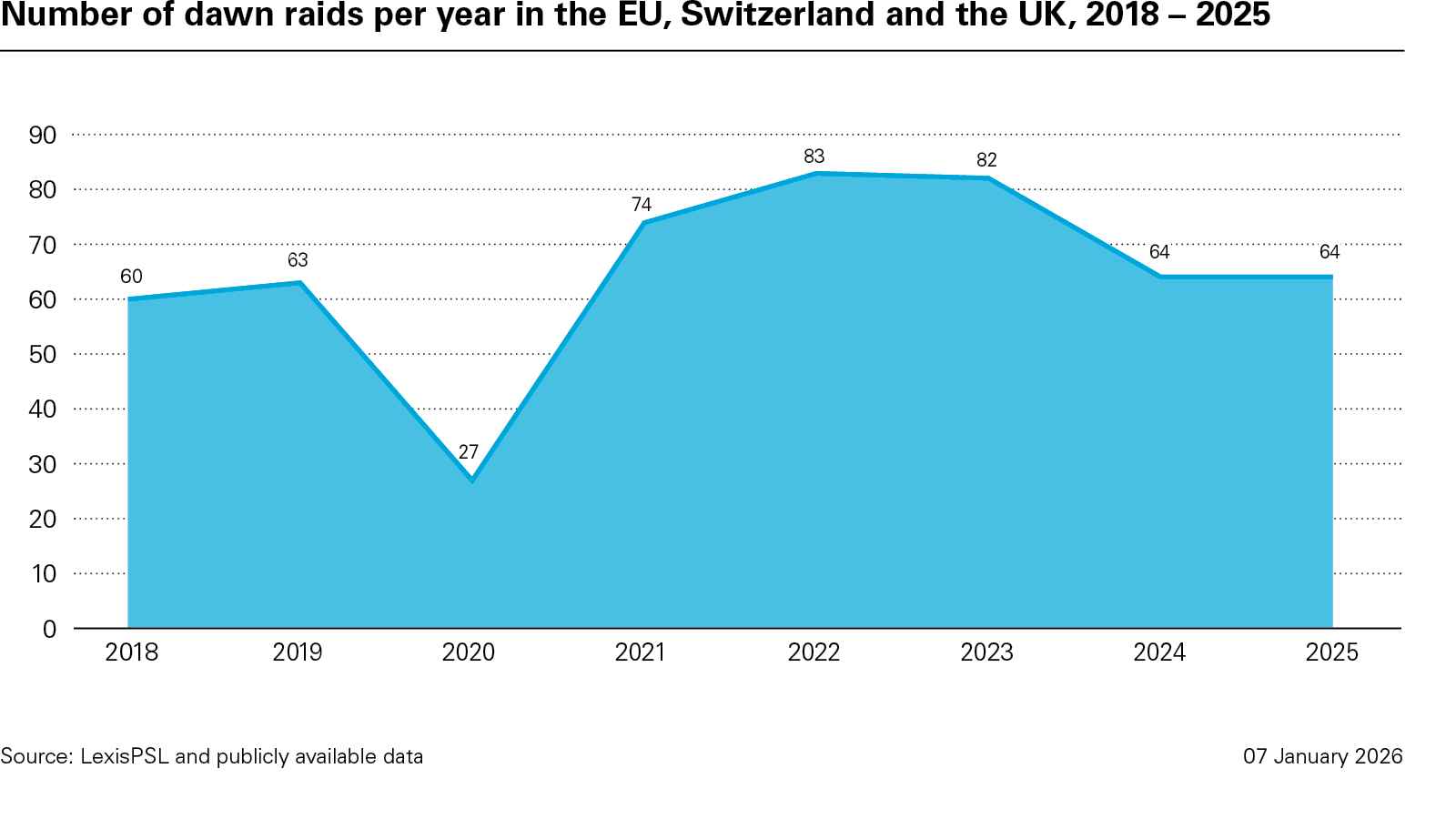 View full image: Number of dawn raids per year in the EU, Switzerland and the UK, 2018 – 2025 (PDF)
View full image: Number of dawn raids per year in the EU, Switzerland and the UK, 2018 – 2025 (PDF)
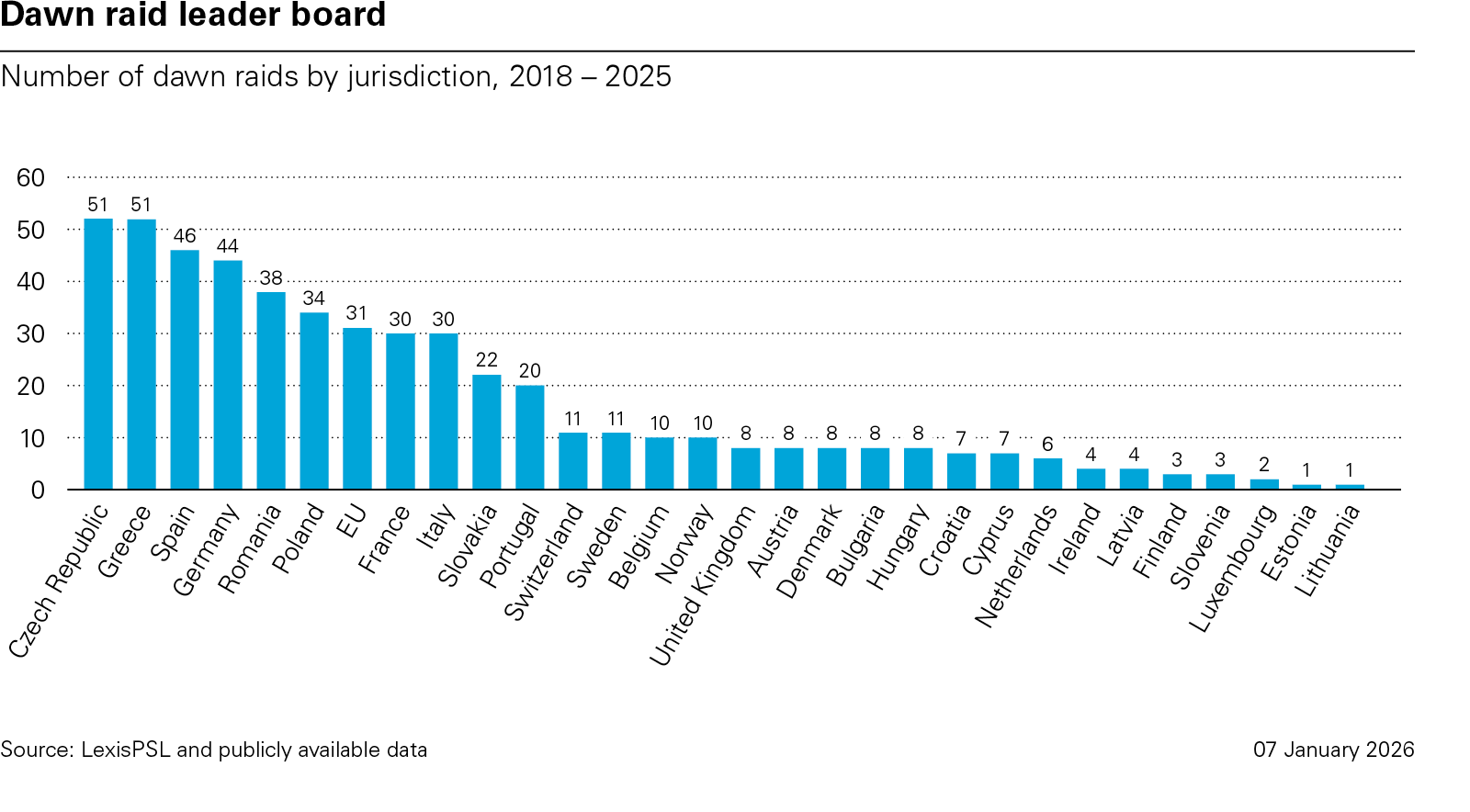 View full image: Dawn raid leader board (PDF)
View full image: Dawn raid leader board (PDF)
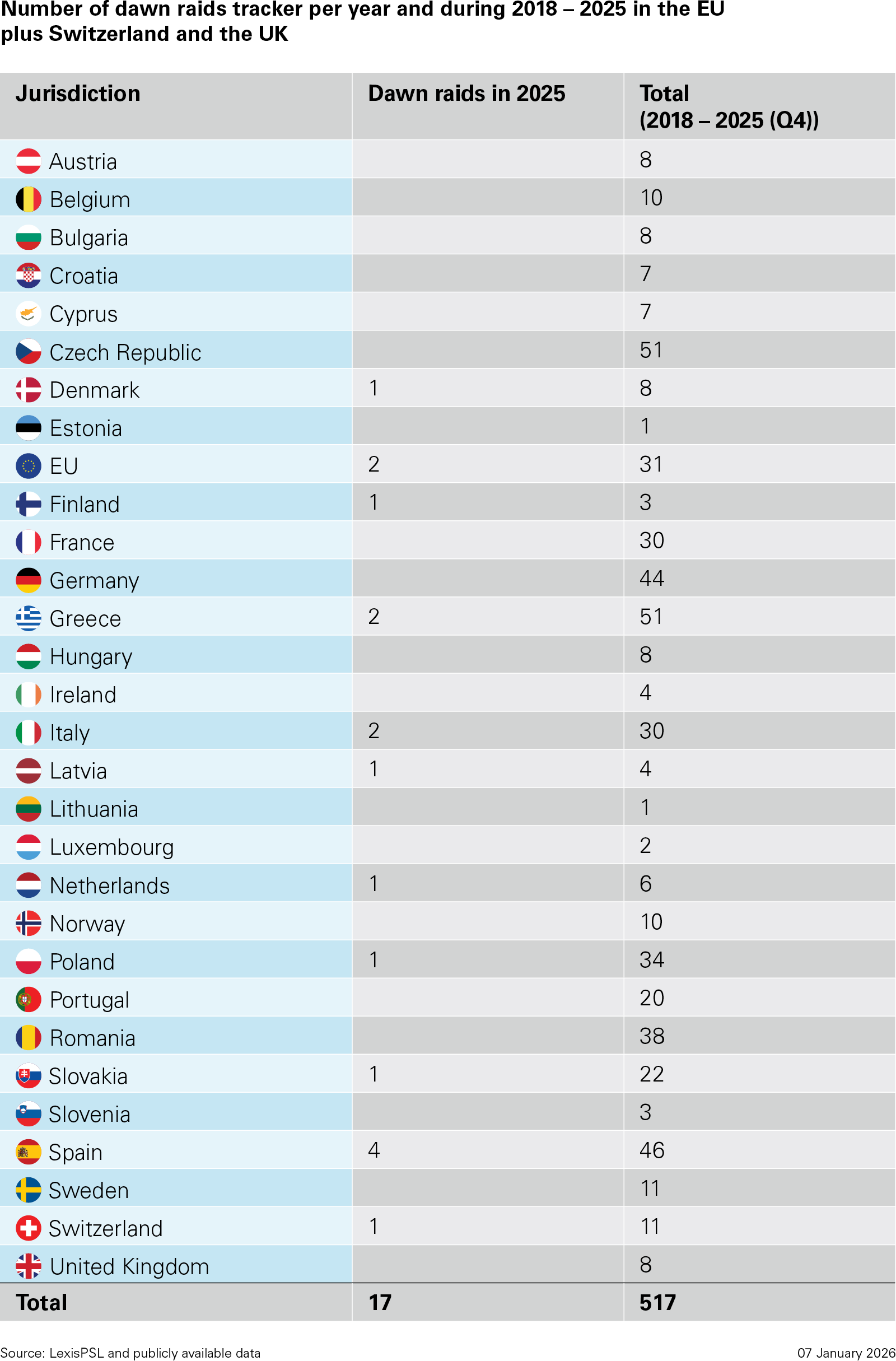 View full image: Number of dawn raids tracker per year and during 2018 – 2025 in the EU plus Switzerland and the UK (PDF)
View full image: Number of dawn raids tracker per year and during 2018 – 2025 in the EU plus Switzerland and the UK (PDF)
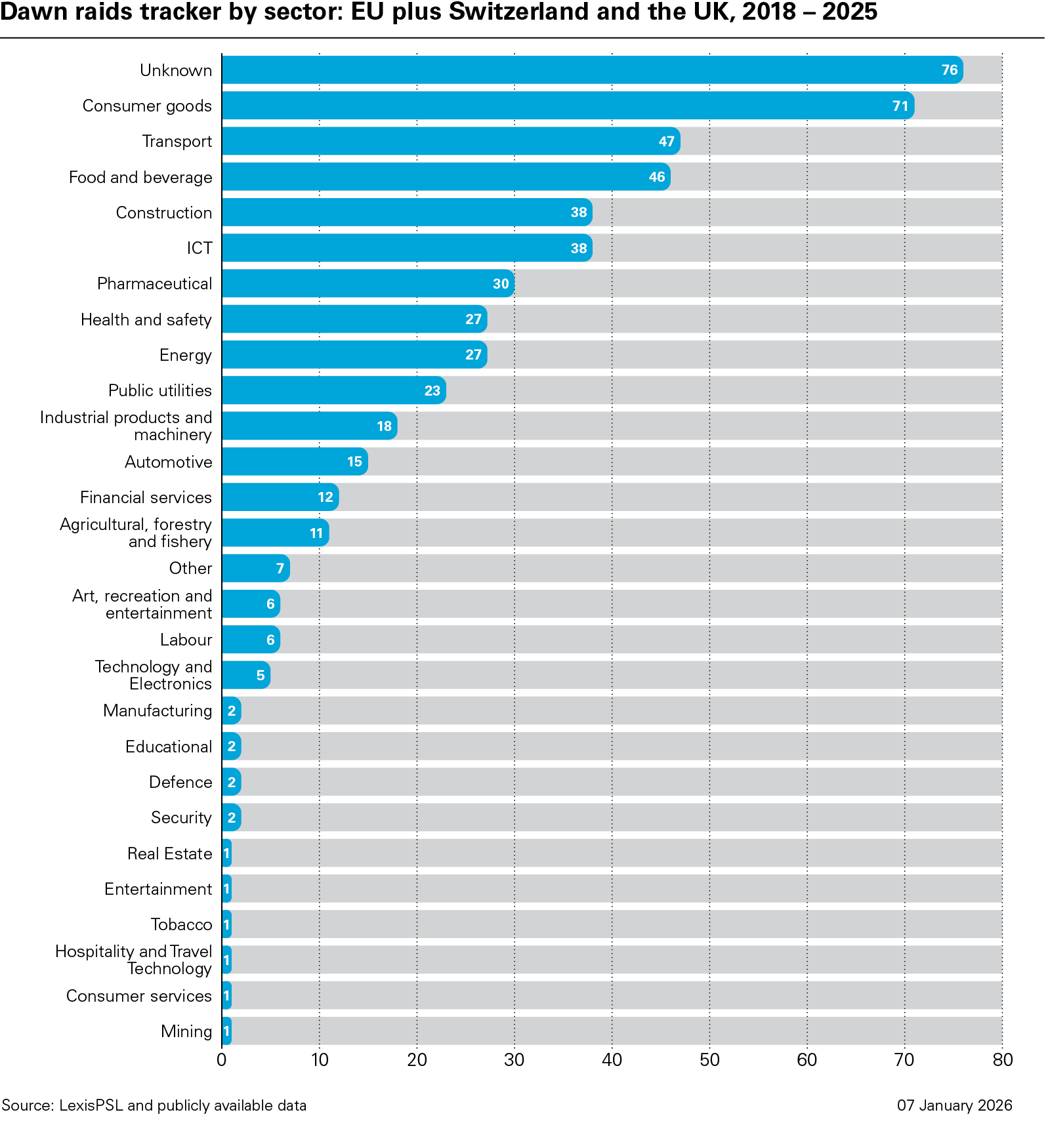 View full image: Dawn raids tracker by sector: EU plus Switzerland and the UK, 2018 – 2025 (PDF)
View full image: Dawn raids tracker by sector: EU plus Switzerland and the UK, 2018 – 2025 (PDF)
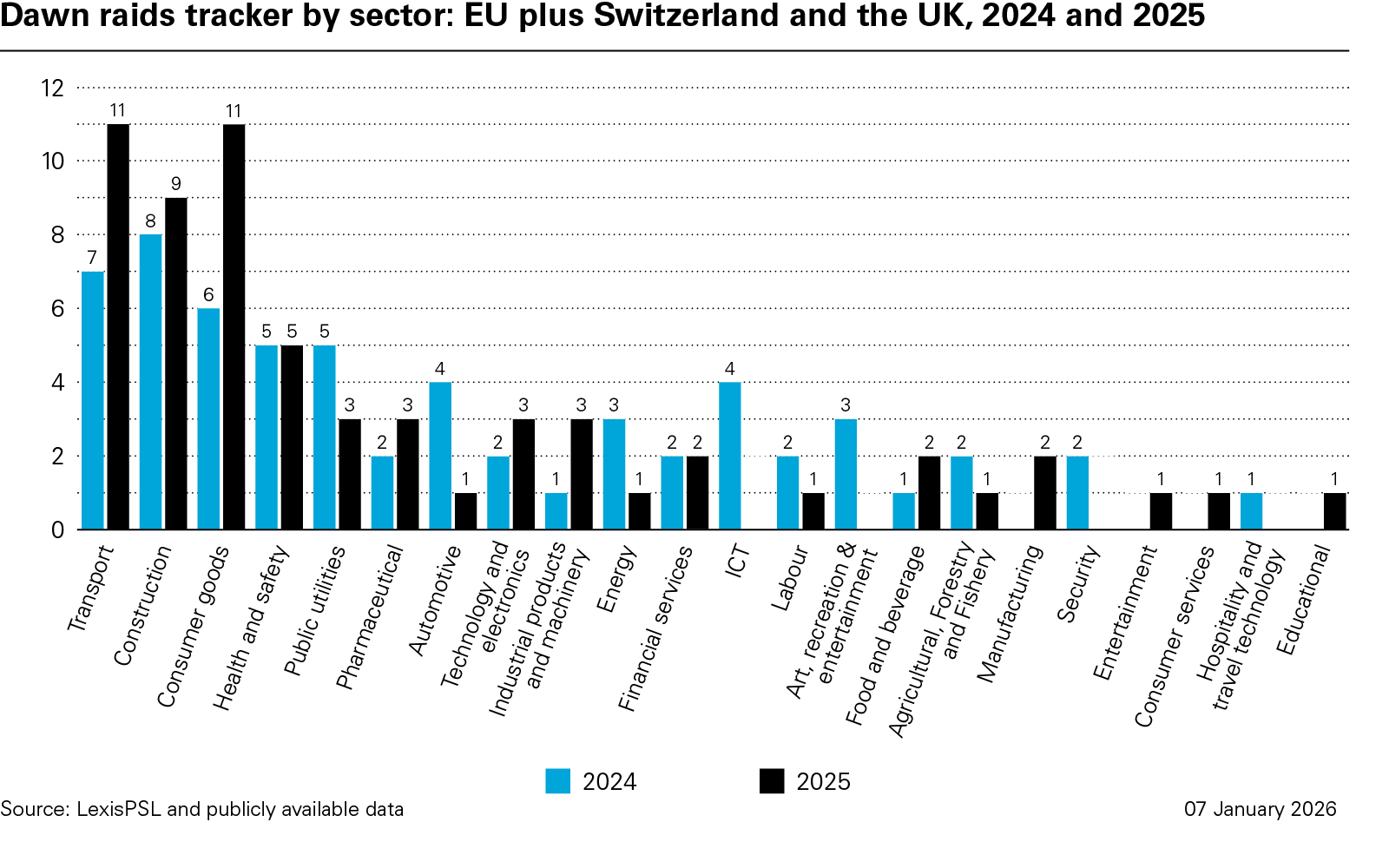 View full image: Dawn raids tracker by sector: EU plus Switzerland and the UK, 2024 and 2025 (PDF)
View full image: Dawn raids tracker by sector: EU plus Switzerland and the UK, 2024 and 2025 (PDF)



